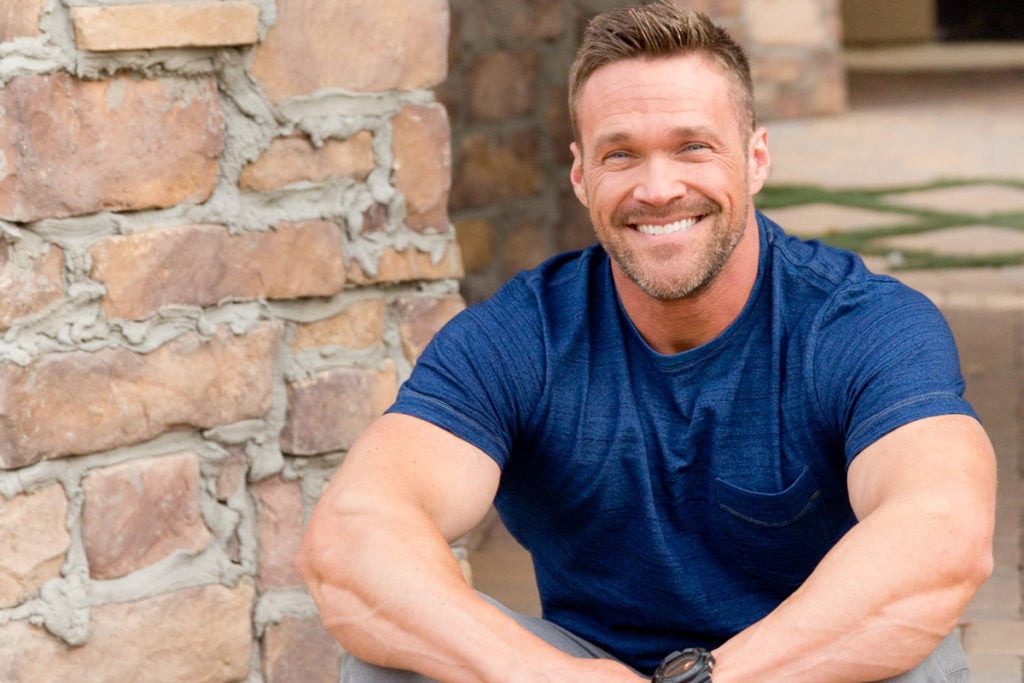It’s a scene many personal trainers know well. You’re working with a client who feels defeated and wants to quit, and you have to show a little tough love. Chris Powell specializes in this. “Every time you tell me you can’t do something, I’m going to tell you that you can,” Powell says to an exhausted contestant on ABC’s Extreme Weight Loss. The contestant perseveres and responds well to Powell’s compassionate but firm direction.
Powell, perhaps one of the most recognizable fitness pros in the business today, is known for his uncanny ability to help severely obese people overcome physical and emotional barriers to achieve monumental transformations—usually to the tune of hundreds of pounds lost. The NASM-certified personal trainer has been interviewed by Oprah and Dr. Oz and has shared his expertise and contagious energy on 20/20 and the TODAY show.
It’s the life many fit pros dream of.
Despite Powell’s achievements and successes, the path hasn’t always been
easy. In fact, as Powell’s professional life was beginning its monumental
ascent over a decade ago, he was, as he describes it, living his own personal
hell. Powell is not unlike those he helps transform; perhaps that’s why he’s so
good at it. He knows what it means to suffer, to reach the depths of darkness,
and to have to rely on others and his own perseverance to overcome the pain.
However, his challenges have made him stronger and more compassionate, and they
are at the root of his mission to help those who are broken and defeated reach
and surpass their goals.
His story truly is about the ups and downs of the American dream and how transformation is an inside-out job.
Facing the Gauntlet
Powell understands what it feels like to be singled out, to be made fun
of for his appearance. He spent much of his childhood suffering at the hands of
bullies. “I was always the smallest kid in school,” he says when asked how he
got into the fitness industry. “I was short and skinny. I remember back in
fifth grade there was a kid who was smaller than I was, and it was the greatest
day of my life up to that point.”
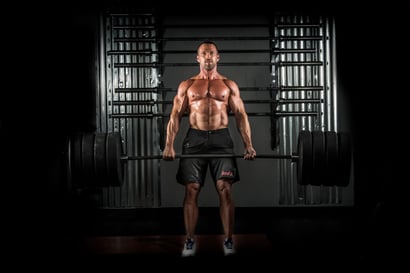
That’s probably one of the few things about school he can joke about, as
his small stature made him an easy target. “When I was in fourth grade, every
single day this fifth-grader would come up to me and say, ‘It’s raining,’ and
then spit in my face. Being harassed on the bus was a daily grind. Kids would
sit behind me and choke me. They’d do everything they could to make me
miserable.”
When Powell was 14, his family moved to the Pacific Northwest. He felt
optimistic about the fresh start and was excited about his new school, which
was known for its football program. An avid fan, he was compelled to try out
for the team. “This was finally my chance,” he says, alluding to the hope that
the bullying would stop. But things didn’t go as planned. Within the first 2
weeks of football camp, the other players made it clear that the new kid was
not welcome.
“They wouldn’t let me drink from the water fountain. They kicked me out
of huddles. They’d hand me the ball—most of these kids were 80 pounds bigger
than I was—make me run through the gauntlet and pummel me. I was their
entertainment. They wanted to see if they could destroy me, and they did. I was
so broken after that, and I felt like I couldn’t handle it anymore. School
hadn’t started yet, and I didn’t want to go.”
Powell says that his parents noticed the pain he felt and offered him
something they thought might help. “I came home from school one day and there
was a TuffStuff® gym in the middle of the room,” Powell recalls. “They said,
‘It’s all yours.’ I had no idea what to do with it, and it sat there unused for
2 weeks. Eventually, I decided to give it a try.”
Over the next 6 weeks, Powell worked out diligently, and his strength
went through the roof. Inspired by the progress, he studied every fitness and
nutrition manual or magazine he could get his hands on.
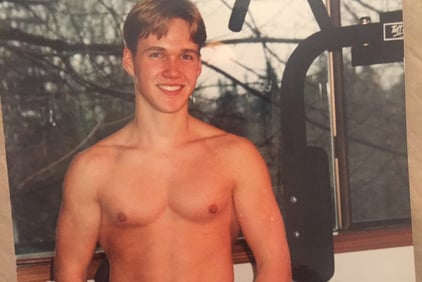
“I remember looking in the mirror and seeing little bulges under my skin
and thinking, ‘This is amazing. My body is changing, and I can see it.’
For the first time since the third grade, I felt empowered. And it was fitness
that gave it to me. It gave me back my identity, power, confidence and
self-esteem. I couldn’t help but be passionate about it.”
From then on, Powell became known as “the fitness guy” on campus. He was
no longer the tiny bully target—he had grown stronger and faster than most of
the kids at school.
“If anyone had a question about fitness, people would say, ‘Go talk to Chris.’”
Passion Becomes Purpose
His interest in fitness, nutrition and physical transformation continued
to grow as he did. Though he had planned to become an airline pilot like his
father (Powell admits he’s deathly afraid of flying planes, despite finishing
flight school and becoming a flight instructor), he decided to pursue a degree
in exercise science at Arizona State University and took a job as a personal
trainer near the school. Within months, he had a wait list.
Around this time, unbeknownst to him, one of Powell’s friends entered
him into Cosmopolitan
magazine’s most eligible bachelor competition, and he won. Local news stations
caught wind of his new title and invited him for interviews. Knowing that
television is a prime avenue for publicity, he asked a producer if he could do
a segment on fitness. The producer agreed, and Powell became the “fitness guy”
on Good
Morning Arizona for 7 years.
Not long after he started on the show, he received an email that would
alter his life’s course. In the message, 26-year-old David Smith stated that he
weighed 650 pounds and that his doctor said he’d be dead by age 30 if something
didn’t change. “He told me that all he wanted to do was fall in love and have
kids,” recalls Powell. “I couldn’t stop thinking about it. After a week, I knew
I had to meet him. So I emailed him back and got his address.”
He went to visit Smith, and the two clicked immediately.
“I told him, ‘I don’t know where this is going to go, but I’ll be back
on Tuesday.’” Two years later, after almost daily meetings and sessions, Smith
was down 400 pounds. The two talked about all the possibilities for the future
and how this transformation could lead to big things.
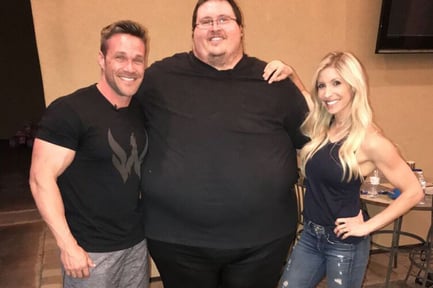
Smith’s story gained attention after Powell featured him on his show,
and, as more and more emails came flooding in, they knew they had to help. “The
emails would say things like ‘Help me, Chris; I weigh 500 pounds and I’m dying.
I’m wheelchair-bound.’ They came from hundreds of people all around the city. I
learned that there is a subculture of people who are beyond morbidly obese and
kind of pride themselves on being invisible. Some of them only come out at
night. They were so hurt by people judging and mocking them all their lives,
hurt by society and hurt by their upbringing. It broke my heart.”
So, with the help of musician Alice Cooper’s wife, Sheryl—she owned a local dance studio—they began to offer donation-based classes for obese individuals. Powell continued to make money training athletes full-time, but he knew he had found his calling: helping these “invisible” people transform and be seen.
The Breakdown
Everything was falling into place, but his world was about to come crashing down around him. One of Smith’s greatest struggles was nutrition, and Powell had the idea to build a behavior modification system that would help his friend make better food choices. “It was basically a wine cooler with food inside of it, and a timer would go off when it was time for him to eat,” Powell explains. “It was a great way to get him carb cycling and to lose weight.”
The invention worked so well that Powell had a
lightbulb moment. If Smith was so successful, the product could probably work
for other people like him. So, Powell put all his money—plus about $200K from
investors—into a manufacturing company in China to build thousands of units
that he would then sell.
“I thought, ‘This is it. I’m going make this system and teach the world
how to eat. I’ll change lives.’ It was the American dream. Unfortunately, I
didn’t know how the American dream worked.”
When the shipment finally arrived, the contents were not what Powell
expected. “I opened the first box and the product fell apart in my hands,” he
sighs. The entire shipment was in the same condition—and he had failed to sign
a contract with the manufacturer. When the company washed its hands of the
situation, Powell went into panic mode.
“There was nothing. My knees buckled, and I sat there crying. It broke
me . . . financially, emotionally, mentally.” Shortly after, Powell began
having panic attacks and trouble sleeping. His bank account was drained, he
couldn’t afford rent, and he had to put all of his belongings in a car and
couch surf. He was diagnosed with clinical depression and took Xanax to manage
the symptoms. Around that time, he suffered a herniated disk and was prescribed
Vicodin for the pain.
“We know how that story goes,” he says. “While [the Vicodin] handled the
physical pain, it also made the emotional pain go away. I was hooked on the
opiates for 2 years.” Meanwhile, Smith had managed to keep the weight off and
decided to post photos of the results on MySpace; his before-and-after pictures
went viral. Soon, interview requests came in from big-name media organizations.
Powell remembers the time well. “I’m in the middle of my crucible,” he says. “I’m in my personal hell and transformation and we’re getting calls from 20/20 and TODAY. I’m in the middle of one of my greatest struggles, and we’re on our way to Chicago to do ‘Oprah.’”
Back on His Feet
This time, it was Smith’s turn to take on the role of the transformer.
“What people didn’t see was that he was there for me when I was going through
my transformation—in the midst of all this crazy media when I’d lost
everything. I stayed on his couch for 3 months while I was getting back on my
feet,” Powell says.
Powell realized he could no longer hide from his responsibilities, and so he quit the Vicodin cold turkey and went back to work to chip away at his debts. He focused on rebuilding himself emotionally and mentally by attending self-improvement seminars, which is where he met Heidi, the woman who would become his wife.
In the Limelight
Smith’s remarkable weight loss became the subject of a wildly popular
TLC documentary. Once it aired, television producers contacted Powell about
doing a weekly show focused on stories like Smith’s. That show, Extreme
Makeover, was picked up by ABC, ran for 5 years, featured 76
transformations and was sold to television stations in 138 countries.
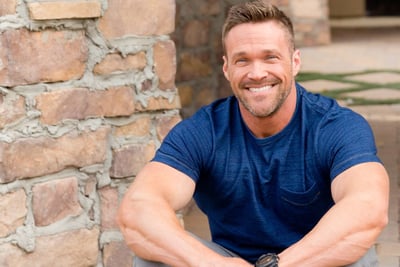
Powell says that doing the show was an incredible experience because he
got to play an instrumental role in helping people in dire circumstances turn
their lives around. The hard part, he says, was receiving the hundreds of
thousands of letters from people like those featured on the show—people he
couldn’t help.
“We’ve collected over a million emails from people asking for help,” he
says. “It was so painful because there was nothing we could do; we were only
doing 15 transformations per year through the show. That’s it.” Once the show
was over and his contract ran out, Powell pledged to help as many people as
possible, and so he partnered with Heidi to develop Transform, a “massively
robust platform where people can go to get everything they need to transform,”
he says. This relatively new venture seems to have put him at greater ease,
knowing that he has the capacity to reach more people.
“On the show, we did 15 transformations per year. Now, with the app,
we’re doing 40,000 active transformations; it’s the vehicle we’re using to help
the world. I feel so blessed to be where I am. I count those blessings every
single day and always find myself thinking, ‘Is this really happening?’”
Fortunately for so many people around the world, yes, it is happening.
Chris Powell’s Strategies for Success
Chris Powell has had his fair share of ups and downs. Along his very
nonlinear trajectory, he’s picked up some valuable insights that he says helped
elevate his career. Here’s some of what he’s learned:
Build a strong client relationship
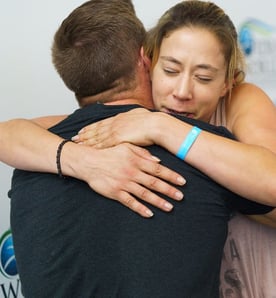
Trust is key in a
client–trainer relationship. Chances are that clients have tried and failed
many times. “They have to put their trust in you, and you have to nurture that
trust and genuinely care about their journey and who they are as a person,”
says Powell. “When they feel that from you, they’ll listen
to you. And then they’re more likely to adhere to a program.”
Set the stage for lasting transformation
It’s important to educate
clients. Give them positive motivation, but also teach them. It’s that whole
“Give a man to fish, he’ll eat for a day; teach a man to fish, he’ll eat for a
lifetime” philosophy. It’s important for people to understand how their body
works and what’s happening through the process. This helps alleviate their fear
of exercise and
transformation.
Get noticed
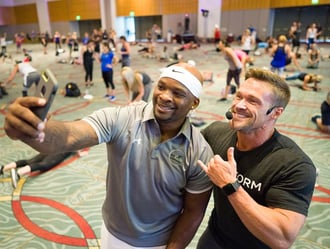
Social media is a must,
and Powell’s advice is to “be unapologetically you.” However, the challenge is
to find a way to stand out. Don’t try to compete with the bikini model. Powell
was able to go on television, do a segment, and then leverage that on social
media and present himself as a credible expert. Traditional media are important
because they operate under FCC guidelines, which means you need to be certified
and insured or they can get sued. It elevates your expert status.
“It’s very difficult to
measure the tangible business results of being on a national talk show, so
anytime I’m on a show I always take a 45-second clip and throw it on social
media. Once it’s posted on social media, you can see the instant engagement and
feedback.”
Diversify your education
The future of fitness will be about combining everything and creating an ecosystem of transformation, according to Powell. Of course, stay within your scope of practice, but also expand your qualifications to encompass at least nutrition consultation and exercise psychology (or behavior modification) to maximize your impact. Be a perpetual student; keep learning through both formal education and experience—or the industry will evolve beyond you.
From Couch to Coach
Bruce Pitcher, a former contestant on Extreme Weight Loss, was
so positively affected by his interaction with Powell that he himself became a
transformation coach.
“Chris is, without a doubt, one of a kind,” Pitcher says. “He is most definitely a brother for life. No one knows how to move and motivate people like he does. I have never seen anyone else walk into a room and get people to believe in themselves—to believe that they can do what seems impossible and that they can transform entirely!”
Beyond Physical Change
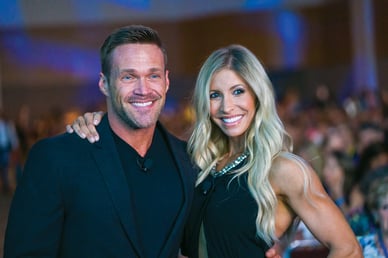
“There is not, nor will there ever be, another like Chris Powell,” says wife and best friend Heidi Powell, who is also a fitness and transformation expert. “His passion extends far beyond creating physical change and is deeply rooted in educating and facilitating change from the inside out. His caring nature and ability to believe in everyone are unlike anything I’ve ever seen. Above and beyond all of this, his dedication and commitment to his mission—reversing the trends and leaving a positive impact on this world—can never be matched. I’m a lucky woman to have him as my husband, my best friend, mentor and example.”
You can learn more about Heidi at HeidiPowell.net.
Transformation Celebration
Share your story on how you’ve
helped change the lives of your clients.
Chris Powell, 2019 Optima keynote speaker, is a master of transformation—and so are thousands of NASM Certified Personal Trainers who work hard every day, helping people improve their lives in many ways. We’d love to hear your client success stories so that we can share them with others and keep the inspiration alive.
Post a photo and/or video sharing how you helped
transform a client’s life, and add the hashtag #MyNASMJourney.

